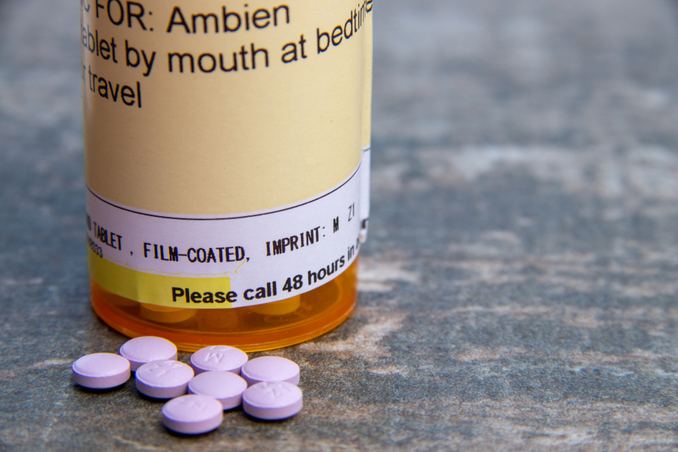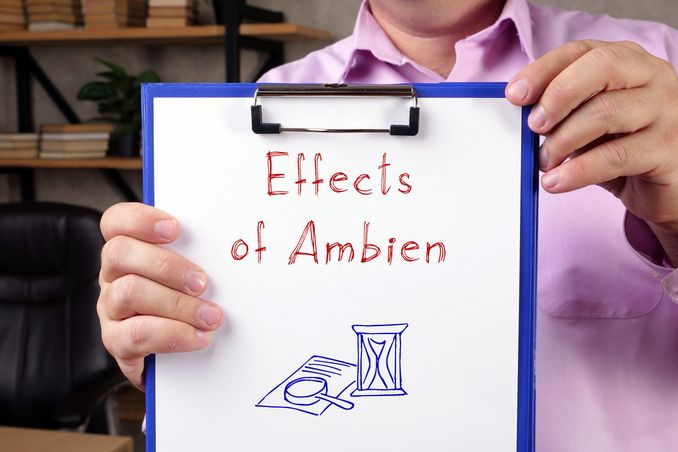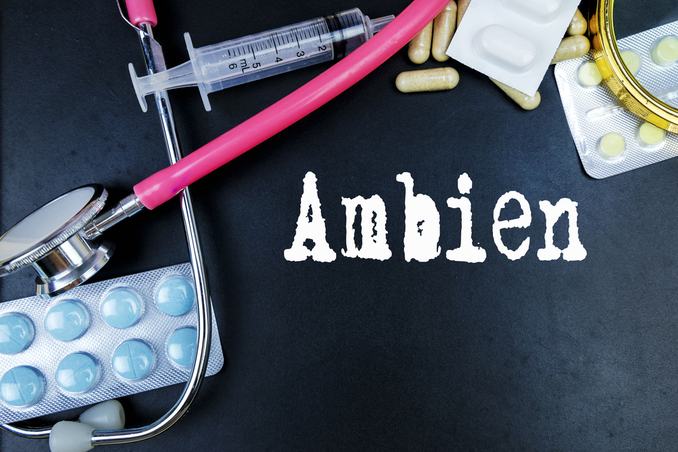The Safest Way to Quit Ambien and Avoid Withdrawal
Table of Contents
- The Safest Way to Quit Ambien and Avoid Withdrawal
- America, the Sleep Deprived
- What are the Signs of Ambien Addiction?
- The Often Overlooked Risks of Ambien
- What to Expect When You Give Up Ambien
- Ambien Withdrawal Timeline
- Minimizing Ambien Withdrawal Symptoms
- Finding a Treatment Program for Ambien Addiction
- Saying Sweet Dreams to Ambien for Good
- Medically Reviewed By
Sleep plays an integral role in our overall health. It allows our bodies to properly heal, rejuvenate, and prepare for each day ahead of us. A healthy and regulated sleep schedule also supports our memory and immune system and reduces the risk of developing heart disease, diabetes, and obesity. There’s no doubt about how great a good night’s sleep can feel, but, unfortunately, this isn’t something that comes easy to many people. For this reason, many of us rely on sleeping aids, and after a time begin to wonder how to quit Ambien and other similar sleep aids. You are not alone.
Keep reading for our advice on how to quit Ambien, and how to find effective treatment options nationwide if you are struggling with sleeping medications!
America, the Sleep Deprived
In fact, 50 to 70 million adults throughout the United States experience either sleep deprivation or struggle with a sleep disorder. As a result, many are prescribed Zolpidem (Ambien) to help them fall asleep. Zolpidem — a form of Ambien — belongs to a class of drugs called hypnotics/sedatives that enables the brain to produce a calming effect throughout the body. Typically, this medication is prescribed for the short-term treatment of insomnia and sleep deprivation for a one to two-week period of time. However, it’s not uncommon for Ambien to be used beyond its recommended prescription, leaving many wondering how to quit Ambien.
Although Ambien is a non-benzodiazepine hypnotic medication, it’s still possible for individuals to abuse this sleep medication. With overuse, many experience a variety of impactful cognitive and psychological side effects. Ambien use has been on the rise in the United States for years, as prescriptions have increased by 220 percent. Along with this increase, there has also been a significant rise in Ambien abuse and dependence.
Is a few doses of Zolpidem a part of your nightly routine to help you catch some Z’s? Do you find that you can’t function normally without taking Ambien? If so, you could be dealing with a severe Ambien dependence, and if so, we’re here to help with how to quit Ambien.
What are the Signs of Ambien Addiction?
Ambien was designed to be an alternative to other sleep medications without the risk of abuse and addiction. Unfortunately, research shows that Ambien can produce tolerance, dependency, and withdrawal — all of which are signs of an addictive substance. However, it’s not always obvious if one is struggling with Ambien addiction, as it tends to fly under the radar until they stop taking the drug and realize one can’t function without it. Eventually, symptoms and side effects do get worse and medical attention will be needed, along with medical guidance on how to quit Ambien.
If Ambien is taken for a short amount of time and in accordance with a doctor’s or medical professional’s instructions, the likelihood of addiction is minimal. When one’s usage exceeds the doctor’s orders, that’s when the risk of addiction increases. Additionally, individuals who have a history of addiction or who are genetically predisposed to substance abuse are more likely to develop an addiction to Ambien.
If you believe you or someone you know may have an Ambien dependency or addiction, but aren’t entirely sure, here are few signs to be on the lookout for:
- Your body needs a higher dose of sleep medication in order to feel the same effects.
- You’ve had to seek a new doctor more than once to get a new prescription.
- Taking Ambien is something you look forward to every day, and you avoid social situations, so you can stay home and take it.
- Your Ambien use exceeds your need for sleep. More often than not, you take it to feel a euphoric effect.
- You begin to isolate yourself from family and friends.
The Often Overlooked Risks of Ambien
Ambien is often overlooked and underestimated as an addictive substance due to its nature to treat sleep problems. As individuals begin to use Ambien past its prescribed date, its effectiveness decreases more, requiring users to increase their consumption. Over time, their insomnia will worsen, and sleeping without Ambien will become impossible. With continued abuse, Ambien can have adverse effects on one’s cardiovascular, digestive, respiratory, and sensory systems. Some of these effects include:
- Rapid and irregular heartbeat
- Skin rashes
- Abdominal pain
- Nausea, vomiting, and diarrhea
- Double vision
- Muscle cramps
- Body spasms
Since Ambien influences receptor cells in the brain in order to induce sleep, many individuals who abuse the drug will also experience a number of cognitive and psychological side effects, including:
- Memory loss
- Night terrors
- Anxiety and depression
- Suicidal thoughts or actions
- Disorientation
- Difficulty concentrating
- Dysphoria (a dissatisfaction with life)
If you or someone you know suffers from the above-mentioned signs and symptoms, it may be time to seek help for Ambien addiction.
What to Expect When You Give Up Ambien
If you’re exhibiting signs of Ambien addiction, it’s time to seek professional treatment and take the next steps toward detox and recovery. It’s never easy to stop using a drug that the body has grown dependent on. But it does take great courage to admit you have a problem and receive treatment for it. This process can be difficult, but many times it helps to know what to expect from start to finish.
Like any addictive substance, Ambien causes symptoms that vary from person to person — especially during the withdrawal stages. The withdrawal process can be long and challenging primarily because these changes are taking place in the brain as it tries to right itself and function without the chemical components of Ambien. Usually, withdrawal from the drug will have the exact opposite effect of taking it, which can lead to the development of more severe symptoms.
During the first few days, individuals can expect to experience the following withdrawal symptoms:
- Mood swings
- Irritability
- Agitation
- Increased blood pressure
- Fever and sweating
- Tremors or convulsions
- Stomach cramps, nausea, and/or vomiting
- Insomnia
- Anxiety, nervousness, and/or panic attacks
The severity of one’s withdrawal symptoms will vary depending on a few factors. Specifically, the longer they were abusing Ambien, the worse their symptoms will likely be. Increased withdrawal symptoms may also present themselves in those who were taking exorbitant doses of the drug or using it in addition to other illegal substances.
Ambien Withdrawal Timeline
On average, withdrawal from Ambien can last anywhere from one to two weeks. However, as mentioned before, the time it takes to detox from Ambien can vary, as each person experiences withdrawal differently. Roughly, individuals detoxing from Ambien can expect to have a similar experience of the following:
- The First 48 Hours: Unlike most sedatives, Ambien has a very short half-life of about two hours. This describes how long it will take for the sleep drug to leave the body. Users can expect to experience withdrawal symptoms within the first 48 hours of their last dose taken. However, symptoms can manifest earlier in those who heavily abused Ambien. Some records show withdrawal symptoms starting as early as one to two hours after the last dose — in the most extreme cases. In milder cases, symptoms will be moderate the first one to two days but will increase over time.
- Days 3-5: Symptoms will usually be at their worst on days three to five. During this time, individuals will likely experience a variety of psychological symptoms like confusion, memory loss, mood swings, and difficulty sleeping. In addition to these symptoms, individuals in this stage of withdrawal are also likely to have panic attacks, nausea, and body tremors. Rebound insomnia will also persist in the first three to five days — we will discuss this symptom further down.
- Weeks 1-2: Withdrawal symptoms tend to peak between the three to five day mark. After that, individuals may begin to feel like their normal selves again. Any residual withdrawal symptoms will begin to reduce and fade, and sleep will begin to be easier to come by. After two weeks, individuals should consider enrolling in an addiction treatment program to ensure maximum recovery from their Ambien addiction.
As mentioned above, a common symptom of Ambien withdrawal is rebound insomnia. Rebound insomnia is when a person is unable to sleep due to their cessation of Ambien, which is common in those who grow dependent on the sleep drug. When individuals stop taking Ambien abruptly, their risk for developing rebound insomnia increases. The length of rebound insomnia varies, but some claim to experience this symptom for several weeks, while it passes in others by the end of withdrawal.
Minimizing Ambien Withdrawal Symptoms
When a person who is struggling with Ambien addiction decides to stop taking the drug, it’s highly likely they will experience withdrawal symptoms, as they are virtually unavoidable. However, detoxing in a professional facility will enable individuals to employ techniques that can be used to make the withdrawal process a little more manageable, and is a better way how to quit Ambien and have the cessation last. Importantly, individuals can use these techniques in treatment and throughout their sobriety journey later in life.
Here are a few strategies that one can use to help minimize withdrawal symptoms:
- Tapering: Tapering Ambien use is much easier and safer than quitting the drug cold turkey. Tapering describes the process of slowly decreasing one’s dosage over time. Tapering should not be done alone, and it’s recommended that this strategy be administered by a medical professional. It’s important to note, tapering Ambien use will take longer, but symptoms will be less severe.
- Healthy Diet: A healthy diet can go a long way — especially in the case of Ambien withdrawal. The detox process places a lot of strain on the body, so it’s imperative to maintain a healthy and balanced diet in order to withstand the worst of the detox. Hydration is also key during this process; water and hydrating fluids will allow the body to flush the toxins out of the body and speed up the detoxification process. Make sure you’re consuming enough proteins, vitamins, and water during withdrawal.
- Exercise: It will no doubt be difficult to exercises during withdrawal since it puts your body through a lot. However, once withdrawal and detox are completed, it’s important to establish an exercise routine in your day-to-day schedule. If you can manage light walking during detox, try to do so regularly, as it will help speed up the detox process. Studies show that yoga can even assist in detox. So, if you have the energy, give it a try.
- Seek Support: This is the most important of them all. If you are struggling with Ambien addiction and ready to find sobriety, please know that you do not have to do it alone. Please seek out support before initiating this long journey. If you can’t get the support you need from family and friends, there are other options to consider. Inpatient and outpatient treatment facilities can help you through this difficult process, and there are plenty of local support groups filled with people who are going through or have gone through similar situations as yours. Support groups like AA and NA are especially important to attend after the detox and rehabilitation process, as they will provide you with the tools and community necessary to keep you sober.
Together, these strategies can help minimize Ambien withdrawal symptoms throughout the entire recovery process, and be a meaningful means for how to quit Ambien. It’s important to mention that treating most substance abuse and addiction and its related symptoms is much more effective when done in a professional facility. Specifically, combining the tampering process with behavioral and cognitive therapies is proven to increase the chances of a successful recovery.
Finding a Treatment Program for Ambien Addiction
If you’re looking for how to quit Ambien addiction for good, it’s recommended to attend either an inpatient or outpatient rehabilitation program for the best outcome. Many of these facilities offer top-of-the-line detox programs that are medically managed and ensure patient safety, care, and comfort.
Finding the right facility that meets all your needs is easier said than done, which is why it’s important to do some thorough research before making any decisions on how to quit Ambien in the most effective manner for you.
If you’re looking for a program to help you overcome your Ambien addiction, here are a few things to keep in mind:
- Consider the facility’s location
- Research the facility’s staff and verify their education and training
- Decide whether you want an inpatient or outpatient facility
- Look into the facility’s success rates
- Make sure the facility offers a comprehensive approach and provides treatment for coexisting conditions such as depression and anxiety (Dual Diagnosis treatment).
You can also talk to your doctor or primary care physician about your options as well. They can provide you with a list of treatment facilities or reputable resources to help you get started on this important journey.
Saying Sweet Dreams to Ambien for Good
Recovery from Ambien addiction is possible, and you are not alone in this journey. With the right facility and support system, you’ll be able to proudly say sweet dreams to Ambien abuse, and never have to worry about how to quit Ambien again.
For more information regarding Ambien addiction and its related withdrawal effects, call Find Addiction Rehabs today. Our team of specialists is here to help you locate the best and most reputable addiction treatment facility and detox center — enabling you to successfully detox from Ambien and start the path to a happy and sober life. Give us a call today.
Deborah Tayloe is a freelance writer specializing in health and sciences. Deborah earned a B.S.Ed. in Secondary Education/English, accompanied by a Spanish minor. Her writing expertise allows her to craft engaging, impactful articles to help people be well.
In addition, she holds a fully accredited Certificate of Natural Medicine and is a certified Herbalist. Through her understanding of complementary medicine, Deborah helps medical professionals give people the information they need to embrace natural approaches to wellness.
When she’s not working, Deborah trains for 5K races and advocates for animal rights.




